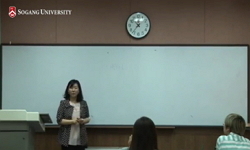Almost two years have passed since the introduction of the professional law school system in Korea. Now that the system is taking shape, the most important task that remains now is to decide what to teach in professional law schools, and how. This may...
http://chineseinput.net/에서 pinyin(병음)방식으로 중국어를 변환할 수 있습니다.
변환된 중국어를 복사하여 사용하시면 됩니다.
- 中文 을 입력하시려면 zhongwen을 입력하시고 space를누르시면됩니다.
- 北京 을 입력하시려면 beijing을 입력하시고 space를 누르시면 됩니다.

법학전문대학원 교과과정의 몇 가지 쟁점 = Some Issues of Curriculum of Law Schools - With the Case of Sungkyunkwan Law School -
한글로보기https://www.riss.kr/link?id=A82504412
- 저자
- 발행기관
- 학술지명
- 권호사항
-
발행연도
2010
-
작성언어
-
- 주제어
-
KDC
360
-
등재정보
KCI등재
-
자료형태
학술저널
- 발행기관 URL
-
수록면
1198-1225(28쪽)
- DOI식별코드
- 제공처
- 소장기관
-
0
상세조회 -
0
다운로드
부가정보
다국어 초록 (Multilingual Abstract)
Almost two years have passed since the introduction of the professional law school system in Korea. Now that the system is taking shape, the most important task that remains now is to decide what to teach in professional law schools, and how. This may well be the most important and fundamental thesis underlying the purpose of the establishment of professional law schools and yet, not enough studies have been made on the subject nor has a consensus been reached among the professors or between professors and students. This paper seeks to answer the above question of what to teach in professional law schools and how, or in other words, how to compose the curriculum of professional law schools, with the case of Sungkyunkwan Law School. As a matter of fact, the answer to the above question is already stated in Article 2 of Act On the Establishment and Management of Professional Law Schools. The article states that "the educational ideology of professional law schools is to train legal professionals who have sound professional ethics based on rich education, a deep understanding of people and the society, and morals valuing freedom, equality and justice; and who have knowledge and abilities that will allow professional and efficient solutions to diverse legal disputes, in order to provide high quality legal services responding to the diverse expectations and requests of the people. In order to preserve the intent of the above law, professional law schools should reflect on the former law education, which was remote from solutions to real-life problems but merely stayed at the stage of education focused on abstract theories and preparation for examinations. Accordingly, the curriculum of professional law schools should be distinctively different from that of the past, and should be reformed so that legal professionals are trained to hold a sense of morals and values, and are capable of providing professional and efficient solutions to complex legal disputes. Taking the above points into consideration, the curriculum of Sungkyunkwan Law School was composed as follows. First, balance between mandatory and non-mandatory courses was considered. Second, balance between theoretic and practical courses was considered. Third, a eight-major-category-system was introduced to help students raise their basic talents as legal professionals and proficiency in their area of expertise. Fourth, and unified education was implemented with new learning methods such as team teaching and PBL to help students raise practical and creative problem-solving abilities. Fifth, more opportunities for various externships and internships were provided to the students to help them raise their practical abilities and experience more about their area of expertise. Sixth, through a substantial exchange with universities abroad, more opportunities were provided to the students to increase their foreign language abilities and ultimately, strengthen their international competitiveness. The following are what need to be complemented to the curriculum of Korea's professional law schools, including Sungkyunkwan Law School. First, in order for professional law schools to advance from an institute that just prepares students for examinations, to amore specialized and professional educative institute, the number of mandatory courses should be minimized and the students' right of choice maximized. Second, considering the establishing purpose of professional law schools and the reality where professional law school graduates are immediately thrown into actual business, the number of practical courses should be increased and the content of the education strengthened. Third, the former cramming system of education should be avoided and instead, new learning methods such as question-and-answer, Socratic method, team teaching, and PBL should be adopted and encouraged.
목차 (Table of Contents)
- Ⅰ. 머리말
- Ⅱ. 필수과목과 선택과목 간의 균형
- Ⅲ. 이론교육과 실무교육의 조화
- Ⅳ. 법학교육방법론
- Ⅴ. 맺는 말
- Ⅰ. 머리말
- Ⅱ. 필수과목과 선택과목 간의 균형
- Ⅲ. 이론교육과 실무교육의 조화
- Ⅳ. 법학교육방법론
- Ⅴ. 맺는 말
동일학술지(권/호) 다른 논문
-
- 성균관대학교 법학연구소
- 김비환(Kim, Bi-Hwan)
- 2010
- KCI등재
-
- 성균관대학교 법학연구소
- Patricia Goedde
- 2010
- KCI등재
-
- 성균관대학교 법학연구소
- 김용섭(Kim, Yong-Sup)
- 2010
- KCI등재
-
- 성균관대학교 법학연구소
- 황남석(Hwang, Nam-Seok)
- 2010
- KCI등재




 KCI
KCI 스콜라
스콜라







